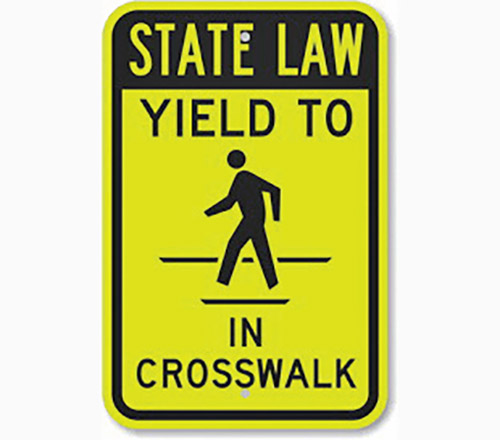
We really do not get it on the one hand, and on the other hand we do. Vibes have come our way regarding how much people despise the “sting” operation that is going on in the Queen Anne Road area, where drivers are being ticketed for not stopping for pedestrians as they cross the street in designated crosswalks.
If someone could explain to us how else this rule could be enforced we would love to hear about it. The fact that The Jewish Link offices are located on Queen Anne allows us each day to suffer the dangers of trying to cross the streets at the designated crosswalks to find that cars just go zooming by us. We are not sure how many people realize the large number of students from local schools who are busy running back and forth to school in between grabbing bites to eat in any of the local establishments.
In so many cases no one gives them a chance to cross. Therefore, for the angry crowd protesting the “entrapment” philosophy, having a decoy trying to cross the street and then radioing to his police counterparts a block away that a particular car did not stop at the crosswalk, we ask: what are the police supposed to do in order to have this rule enforced?
It just reminds us of the fact that people are never satisfied. When a child or teenager or adult is hit at one of these crosswalks, you can be sure that the parents and friends of the victim will be shouting from the rooftops. We watch it each Shabbat on the corner of New Bridge and Westminster, as even the crossing guard has a difficult time getting cars to stop for people going to shul. How do we educate people?
We are angry when there are speed traps set up anywhere. We remember as children driving with our parents through small towns, where until reaching the city limits a speed limit would be 55 mph, and then suddenly for a small four-block area the limit would go down to 25 mph. There were the local police, in some cases the sheriff, sitting in his car waiting to ticket the offenders. Our parents were always angry at such speed traps and would laugh about how this was the means that these towns used to make money. Honestly, though, if you really think about it, who wants a car speeding through a small tiny area of several stores and a few houses?
Today, most of us do not move without Waze, and listen for that warning that there are “police ahead,” giving us the heads-up to slow down prior to arriving at a specific junction. Are these laws not meant to prevent disasters? Are they not meant to protect us? Many years prior to Waze we drove along equipped with a CB attached to our car. Suddenly, someone would come on the frequency and alert everyone that there was “bubblegum ahead.” (For those not in the know, that meant police.) We, along with everyone else, were grateful for the heads up.
The question seems to be do we or don’t we want to have the police enforce laws that have been created with our safety in mind. Yes, there are times when it seems ridiculous to drive 25 mph on Teaneck streets, yet as we get older we seem to have a better understanding of the need to slow down. How much difference in time will it actually make in reaching our destination? Sometimes we watch cars as they anxiously weave from lane to lane in order to get to wherever they are going more quickly, only to meet them several blocks ahead at the same traffic light. Yet, what would have happened if the driver who was in so much of a rush accidentally hit a child who darted in front of his car in order to retrieve his ball? Would he then blame the police for giving him a ticket?
Rules are not meant to be broken. Instead of honoring the work the local policemen do by putting themselves on the line each and every day, we find many ridiculing and resenting the enforcement of laws meant to save lives. Time to own up to the responsibility of taking things seriously before tragic events occur. After the fact is definitely too late.
By Rabbi Mordechai and Nina Glick
Rabbi Mordechai and Nina Glick are living in Bergenfield after many years of service to the Montreal Jewish community. Rabbi Glick was the rav of Congregation Ahavat Yisroel as well as a practicing clinical psychologist in private practice. He also taught at Champlain Regional College. The Glicks were frequent speakers at the OU marriage retreats. Nina coordinated all Yachad activities in Montreal and was a co/founder of Maison Shalom, a group home for young adults with special needs. They can be reached at nina@jewishlinknj.com.











